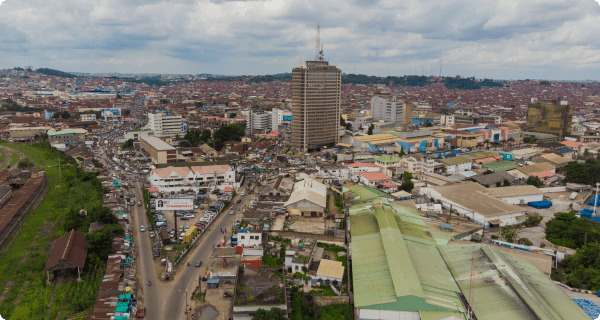WHAT'S DRIVING THE GROWTH OF REAL ESTATE IN NIGERIAN CITIES?
Despite economic challenges, the demand for residential, commercial, and industrial properties continues to surge. This article explores the major factors driving this real estate boom in Nigeria and the key reasons behind the rapid growth of real estate in Nigerian cities.

The Nigerian real estate market has witnessed tremendous growth in recent years, especially in fast-developing cities like Lagos, Abuja, Port Harcourt, and Ibadan. Despite economic challenges, the demand for residential, commercial, and industrial properties continues to surge. But what are the major factors driving this real estate boom in Nigeria? In this article, we explore the key reasons behind the rapid growth of real estate in Nigerian cities.
1. Rapid Urbanization and Population Growth in Nigeria
Nigeria is one of the fastest-growing countries in the world, with a population projected to exceed 400 million by 2050. This population explosion has led to massive migration from rural to urban areas as people seek better job opportunities, education, and quality living conditions. As a result, cities like Lagos and Abuja are experiencing a housing demand surge, leading to increased investments in residential estates, apartment complexes, and mixed-use developments. The need to accommodate this growing urban population is a key driver of Nigeria's real estate growth.
2. Expanding Nigerian Middle Class and Increasing Income Levels
The emergence of a vibrant middle class with higher disposable income is fueling the demand for modern housing and commercial spaces. Nigerians are now looking for properties that offer comfort, security, and prestige. Developers are responding to this demand by constructing luxury apartments, gated communities, and high-rise condominiums in prime locations like Lekki, Victoria Island, and Asokoro. Flexible payment plans, including mortgages and installment options, have made it easier for middle-income earners to invest in real estate.
3. Nigerian Diaspora Investments and Remittances
Remittances from Nigerians in the diaspora significantly impact the real estate sector. Many Nigerians abroad see property investment in Nigeria as a way to secure their future and contribute to national development. With remittances estimated in billions of dollars annually, a substantial portion goes into purchasing homes, lands, and commercial properties, particularly in urban areas with rising property values. Developers are also creating real estate packages specifically for diaspora investors, offering guaranteed returns and secure transactions.
4. Government Policies and Infrastructure Development
Government initiatives aimed at improving infrastructure are key to driving real estate growth. Major projects such as:
- Lagos Smart City Initiative
- Lekki Deep Sea Port
- Abuja Light Rail Project
- Rehabilitation of major highways and bridges These infrastructure projects boost property values in their vicinities, making them attractive for investors and developers. Public-Private Partnerships (PPP) and government-backed housing schemes are also opening up new areas for real estate development.
5. Foreign Direct Investment (FDI) and Public-Private Partnerships (PPP) in Nigerian Real Estate
The Nigerian real estate market is increasingly attracting foreign direct investment (FDI). Investors from Asia, Europe, and the Middle East are recognizing the huge potential in Nigeria's real estate sector, especially in urban development, luxury apartments, and commercial properties. PPP initiatives have also led to the development of large housing estates, malls, and office complexes, adding to the modernization of Nigerian cities.
6. Technology and PropTech Innovations in Nigeria
The emergence of Property Technology (PropTech) platforms like www.prexmarket.com has revolutionized property transactions in Nigeria. These platforms simplify the process of buying, selling, and renting properties, making it accessible to a wider audience. By providing verified property listings, secure transactions, and virtual property tours, PropTech is building trust and attracting both local and international investors to the Nigerian real estate market.
7. Rise in Short-Term Rentals and Tourism-Driven Real Estate Demand
The increasing popularity of short-term rentals (such as Airbnb) in cities like Lagos and Abuja has opened up new opportunities in real estate investment. With growing tourism, business travel, and expatriate communities, there is high demand for serviced apartments, guest houses, and short-let properties. Investors are now focusing on properties that cater to these markets, boosting real estate growth.
Conclusion: Why Nigerian Real Estate is booming
In summary, the growth of real estate in Nigerian cities is fueled by:
- Rapid urbanization and population growth
- Rising middle class and diaspora investments
- Government policies and infrastructure development
- Foreign direct investment and public-private partnerships
- Technology-driven real estate platforms (PropTech)
- Short-term rentals and tourism demand As Nigeria continues to evolve, real estate remains a critical sector for both the economy and individual wealth building. However, to sustain this growth, challenges such as affordable housing deficits, land documentation issues, and regulatory bottlenecks must be addressed.
Ready to Invest in Nigerian Real Estate?
Explore verified and affordable property listings on www.prexmarket.com, Nigeria's trusted platform for safe and secure real estate transactions.
Share this story:


